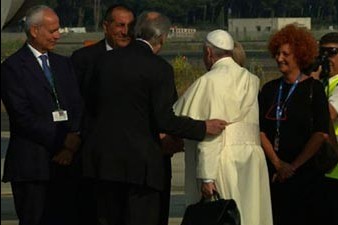
06/07/2015 13:04
More than 1 million expected at pope's Mass in South America
Pope Francis travels to the Ecuadorean port of Guayaquil on Monday for a Mass expected to draw more than a million people, as Latin America's first pontiff tours his home continent with a message of compassion for the weak and respect for an ailing planet. AP reports.
Francis is taking it relatively easy on his first full day in Ecuador, making the quick flight to Guayaquil for the Mass at the Shrine of the Divine Mercy and then a lunch with a group of fellow Jesuits.
The highlight of the encounter will likely be his reunion with the Rev. Francisco Cortes, a Jesuit affectionately known as "Padre Paquito," to whom the Argentina-born pope, then the Rev. Jorge Mario Bergoglio, entrusted his seminarians on study trips to Ecuador years ago.
In a recent interview with The Associated Press, Cortes couldn't fathom that Bergoglio remembered him, much less made a point of coming to have lunch.
"I don't know what to ask him," the soon-to-be 91-year-old Cortes said. "He said he wanted to see me and I'm amazed that he's coming. For the first time, I have known a pope."
The "pope of the poor" returned to Spanish-speaking South America for the first time as pontiff Sunday, stressing the need to protect the needy and the environment from exploitation and — in a nation whose president was booed as his vehicle followed the papal motorcade Sunday — to foster dialogue among all sectors of society.
Francis' only other trip back to his home ground after being elected pope was in 2013, when he visited Brazil, where Portuguese is the main language.
Children in native dress greeted Francis at Mariscal Sucre airport outside Ecuador's capital, the wind blowing off his skullcap and whipping his white cassock as he descended from the plane following a 13-hour flight from Rome.
In a speech in front of President Rafael Correa, Francis signaled some key themes for the visit, which also takes him to Bolivia and Paraguay: the need to care for society's most marginal, guarantee socially responsible development and defend the Earth against profit-at-all-cost development that he says harms the poor the most.
"From the peak of Chimborazo to the Pacific coast, from the Amazon rainforest to the Galapagos Islands, may you never lose the ability to thank God for what he has done and is doing for you," he said from the tarmac. "May you never lose the ability to protect what is small and simple, to care for your children and your elderly who are the memory of your people, to have confidence in the young and to be constantly struck by the nobility of your people and the singular beauty of your country."
It's a message that is particularly relevant for Ecuador, a Pacific nation of 15 million people that is home to one of the world's most species-diverse ecosystems but is also an OPEC country heavily dependent on oil. High crude prices allowed Correa to get take 1.3 million people out of poverty in his eight years in office.
But now that they've fallen, the generous social safety net Correa has woven is threatened. He's had to cut government spending and been buffeted for nearly a month by the most serious anti-government street protests of his tenure.
Along Francis' motorcade route into Quito, the throngs followed chants of adulation for the pontiff with jeers of "Correa out!" when the president's entourage followed.
Correa has also angered environmentalists and the nation's main indigenous group, CONAIE, by moving forward with oil drilling and mining projects in pristine Amazon forests.
CONAIE was not participating in papal visit-related events, though it was sending a 30-person delegation to one gathering, said former President Humberto Cholango. He said the Vatican said the pope's schedule was too tight.
Standing by Correa's side at the airport, Francis pledged that the Catholic Church's readiness to encourage respect for peoples' differences and foster "dialogue and full participation" to a better future can be ensured for all, particularly "the most vulnerable of our brothers and sisters."
Correa, who spoke before Francis, echoed the pope's concerns about the "perverse" global economic system, accusing the world's rich countries of unfairly exploiting the developing world's resources without reciprocating with technology transfers.
Francis, straying from his prepared remarks, thanked Correa for his "consonance of thought."
"You've cited me too much," he said.
The Vatican spokesman, the Rev. Federico Lombardi, said Francis wasn't worried about the protests against Correa. He estimated that 500,000 people lined the route that took Francis to the Vatican ambassador's residence. Many in the crowd said they hoped the pope would have a calming effect on the country's tense political situation.
Travel agency worker Veronica Valdeon called the Argentine pontiff "a light in the darkness."
"We are living difficult moments in our country, and Francis brings a bit of joy," Valdeon said.
Francis chose to visit Ecuador, Bolivia and Paraguay specifically because they are among the poorest nations in a region that claims 40 percent of the world's Catholics.
He's skipping his homeland of Argentina, where he ministered to the poorest slum-dwellers while archbishop, to avoid papal entanglement in this year's presidential election.
Francis' stops later in the week include a violent Bolivian prison, a flood-prone Paraguayan shantytown and a meeting with grass-roots groups in Bolivia, the sort of people he ministered to in the slums of Buenos Aires.
Crowds are expected to be huge.
While the countries themselves are small, they are fervently Catholic: 79 percent of the population is Catholic in Ecuador, 77 percent in Bolivia and 89 percent in Paraguay, according to the Pew Research Center.
Before leaving Rome, Francis did some hometown ministering, with Lombardi saying the pope welcomed 10 homeless people into the Vatican.








